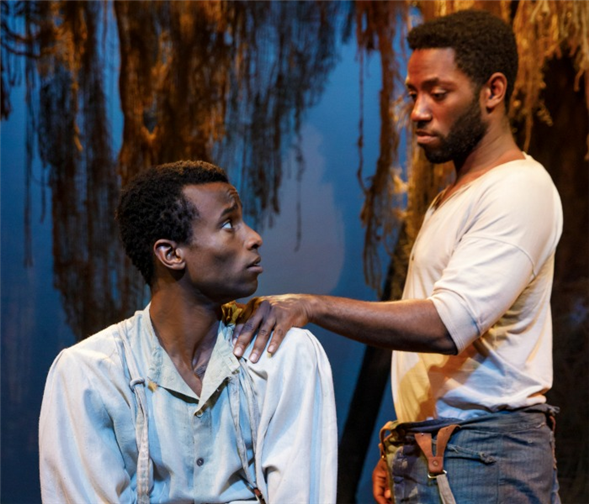Translate Page

Playwright Donja R. Love explores queer love in the Civil War South
---
In the opening scene of Sugar in Our Wounds, Donja R. Love's lyrical world premiere at Manhattan Theatre Club, a young plantation slave stands under a gigantic tree and hears it call his name: "James." That fantastical moment recalls the inception of the Civil War South-set play. "When I sat down to write it, the first character that started talking was the tree," says Love. "I had no clue what that meant!"
Love admits Sugar in Our Wounds took quite a long time to grow from seed to script. "For about seven years the play was writing itself in my mind," he says. "It got to a point in January of 2016 where the characters said, 'Donja, we're tired of being locked up in your head. We need to be out. Get us out!'" Those characters were all human; the arbor only starting speaking once Love committed to telling their stories. Now that tree dominates the stage. It's a symbol fraught with meaning in African-American culture, representing families torn asunder by slavery as well as a reminder of the horrendous history of lynching.
"Before I wrote Sugar in Our Wounds, I had told myself, 'You will never catch Donja writing a piece about slavery,'" Love says. As a self-described "Afro-queer playwright," he felt that exploring contemporary black life was more urgent than parsing the past. But then he read Tarell Alvin McCraney's Marcus; or The Secret of Sweet, the final installment in the acclaimed Brother/Sister Plays trilogy. Although it's set in the 21st century, a character describes the horrific punishment that was meted out to slaves caught engaging in homosexual activity. "I was upset with myself for not knowing this," he recalls. "I was upset with history for not teaching me this."
But along with his dismay came inspiration. "I envisioned two men falling in love with each other during that time period," Love says. "I had never imagined anyone like me existing then."
{Image1}
While the playwright insists that queer romance is the heart of Sugar in Our Wounds, other kinds of hard-won love are present in the play's portrait of slave life. The four main characters aren't sure whether they're actual kin (de facto matriarch Aunt Mama is assumed to be "so old she related ta e'body some kinda way"), but they are most surely bonded by affection. Asked to define love, the abused house servant Mattie responds, "It's somefin' dat we feel. It's ma mama. It's bein' touched even when you got scars on ya face. It's laughin' even when it seem it ain't no joy nowhere round." Even though their hearts are repeatedly broken by the everyday cruelties of enslavement, they are still ready to receive love however it comes, whether it's filial, fraternal or sexual in nature.
The play that Love was initially hesitant to write is now the first part of a trilogy depicting queer relationships throughout the history of black America. The next installment, Fireflies, is set during the civil rights movement and will premiere this fall at Atlantic Theater Company. The final play, In the Middle, brings us into the present, with Black Lives Matter as its backdrop. Collectively, the shows are called the Love* Plays, of course. After Sugar in Our Wound's long gestation period, the playwright was relieved he was able to complete the other two in about a year.
"Honestly, I felt scared," he says about why the first one took a while to come out. "I felt like I wasn't the writer to tell this story. Then I realized that there was no other writer to tell the story that I was going to tell but me."
---
Regina Robbins is a writer, director, native New Yorker and Jeopardy! champion. She has worked with several NYC-based theatre companies and is currently a Core Company Member with Everyday Inferno Theatre.
Top image: Sheldon Best and Chinaza Uche in Sugar in Our Wounds. Photos by Joan Marcus.
TDF Members: Go here to browse our latest discounts for dance, theatre and concerts.